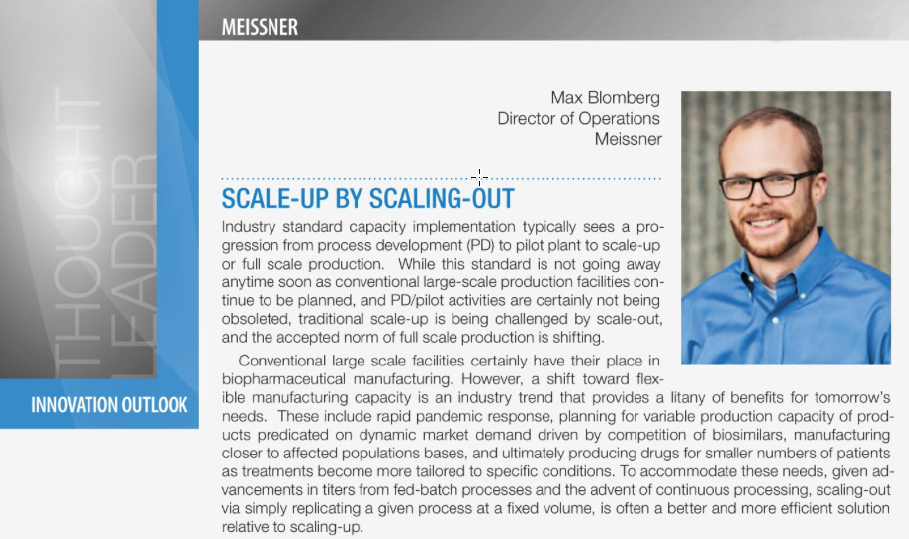Pharmaceutical Technology: Innovation Outlook – Scale-up by Scaling Out

Industry standard capacity implementation typically sees a progression from process development (PD) to pilot plant to scale-up or full scale production. While this standard is not going away anytime soon as conventional large-scale production facilities continue to be planned, and PD/pilot activities are certainly not being obsoleted, traditional scale-up is being challenged by scale-out, and the accepted norm of full scale production is shifting. Conventional large scale facilities certainly have their place in biopharmaceutical manufacturing. However, a shift toward flexible manufacturing capacity is an industry trend that provides a litany of benefits for tomorrow’s needs. These include rapid pandemic response, planning for variable production capacity of products predicated on dynamic market demand driven by competition of biosimilars, manufacturing closer to affected populations bases, and ultimately producing drugs for smaller numbers of patients as treatments become more tailored to specific conditions. To accommodate these needs, given advancements in titers from fed-batch processes and the advent of continuous processing, scaling-out via simply replicating a given process at a fixed volume, is often a better and more efficient solution relative to scaling-up.
The move towards treating ever smaller affected population bases, via treatments more specifically tailored to a given ailment, ultimately leads to personalized medicine. The manufacture of these therapies, despite processing commonalities, by nature, requires scaled-out production via replicating a similar process, at a given volume, to a significant degree. Scaling-out benefits from (and to some degree is predicated upon) the employment of single-use systems (SUS). These systems are not new; however, when applied in the context of scaling-out, wherein larger quantities of relatively smaller SUS may be consumed in increasingly complex and critical applications, the associated common challenges can become exacerbated. These challenges include the ability to rapidly and repeatedly deploy SUS, logistics considerations, and the ability to establish a robust supply chain to ensure consistent delivery of product that meets stringent quality specifications. Further, it is critical that suitable products exist in form factors commensurate with the process scale. What may have historically been a small laboratory filter may now be a critical final filter, and therefore needs to be supported in the same manner as its larger, traditional process scale, counterparts. Meissner is addressing this via new small-scale filtration products designed specifically to meet these needs.
Scaled-out processes also benefit from, and often require, enhanced levels of automation. For drug manufacturers, this is predicated by running a greater number of processes, typically concurrently, and perhaps in advanced operational modes. Likewise, the need for increased automation exists within the supply base which supports scaled-out processes, both in terms of providing integrated process solutions, as well as advancements pertaining to consumables manufacturing methods and technology. Common automation drivers for both drug manufacturers and the supply base include achieving higher degrees of process robustness, rapid augmentation of capacity, and the ability to codify additional manufacturing data. Meissner is addressing this by developing highly automated unit processing solutions as well as next generation SUS connection technology that replaces manually assembled mechanical connections with permanent thermal bonds generated via wholly automated processes.